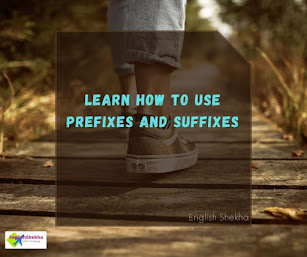Learn How to Use Prefixes and Suffixes
 |
| Learn How to Use Prefixes and Suffixes |
Suffixes and Prefixes
Prefix-----<root-word>------Suffix
un-comfort-able
(un=prefix; comfort=root word; able=suffix)
Affix is a group of letters added to a word to change its meaning and parts of speech. Some affixes can be added to the front of words and some others at the back. An affix added to the beginning of a word to form a new meaning is known as a prefix. For example, ‘mis’ in misunderstand, and ‘un’ in untie are called prefixes.
The most common prefixes in English are – dis, in, re, un. These four covers most of the prefixed words. On the other hand, the most common suffixes are – ed, Ing, ly, es. They also cover most of the words made with suffixes.
Now read the most commonly used prefixes, their meaning, and examples from the following table.
Prefix | Implied meaning | Examples. |
En | increase | Enrich, encourage, enlarge, enjoy, endanger. |
un | not | Unhappy, unjust, uncommon, unpaid, unready. |
re | again | Rewrite, reenter, recall, return, rethink. |
In,im,ir | not | Incorrect, impossible, irrelevant, irregular |
dis | opposite | Dislike, discomfort, dishonor, dismiss, disclose. |
non | not | Nonsmoker, nonstop, nonregistered, non-Indian. |
im | not/opposite | Impossible, impure, impatient, immoral. |
over | above/extra | Overtime, overlook, overweight, overnight. |
Ill | opposite | Illegal, illiterate, illegible, illogical, ill-practice. |
mis | wrong | Misdeed, mistake, misguide, misunderstand. |
sub | under | Substation, submarine, subcommittee, subdue |
anti | against | Anti-nuclear, anti-aircraft, anti-liberation. |
|
|
|
Look at some prefixes, their meaning and words formed with them.
Prefixes | Implied meaning | Words formed |
Under | Small/little | Undersize, underpaid |
Co | with/together | Co-author, coordinator |
Mal | opposite/bad | Malpractice, malnutrition |
de | opposite | Defrost, deform |
fore | front/before | Forehead, forecast. |
Look at the most commonly used suffixes, their meaning, and words made with them from the following table.
Suffixes | Implied meaning | Words/examples. |
S, es | Pluralize/make a verb singular | Books, goes |
ed | Form past tense/past participle/adj. | Helped, (had) helped |
ing | Form present participle/adj/gerund | Running, running car |
ly | Indicate how, when, where, or something happens | Slowly, friendly |
er |
| Player, farmer
Bigger, taller |
ic | Having qualities | Heroic, patriotic |
Able, ible | Able to be | Comparable, invisible |
ness | Indicate state, condition, degree | Brightness, kindness |
ful | Having something | Powerful, handful |
ment | completion | Payment, punishment |





0 Comments